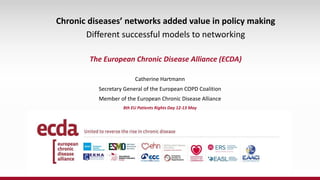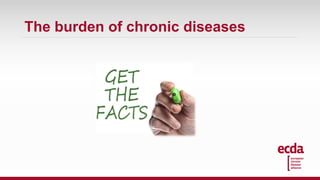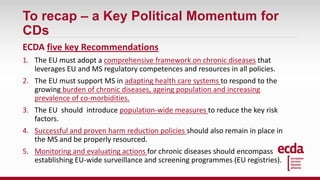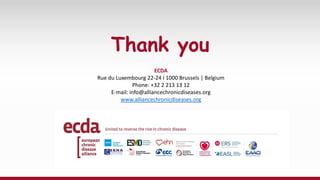Catherine Hartmann Secretary General of the European COPD Coalition
- 1. Catherine Hartmann Secretary General of the European COPD Coalition Member of the European Chronic Disease Alliance 8th EU Patients Rights Day 12-13 May Chronic diseases’ networks added value in policy making Different successful models to networking The European Chronic Disease Alliance (ECDA)
- 2. The European Chronic Disease Alliance (ECDA)
- 3. ECDA – a key stakeholder that brings value Cancer CVDs Allergies COPD & asthma Kidney diseases Diabetes HCPS Patients Care takers Liver diseases Researchers
- 4. ECDA’s structure • Association de fait • Full and Associate members • Unanimously adopted decisions • Professional secretariat
- 6. The burden of chronic diseases
- 7. Benefits of Stakeholders involvement in response to Chronic Diseases • For the EU policymakers • For the EU stakeholders
- 8. What ECDA does Drafting white papers and statements, providing input to consultations, sending letters, taking part in an EU Funded project, press articles – advocacy tools are numerous
- 9. What ECDA does - 2 Meeting with key EU officials- and in particular, directors & heads of unit at the DG SANCO: DG SANCO representatives EU Commissioner for health, EU health award, Gastein 2010
- 10. ECDA Call for Action Urgent political action is needed to reduce the human, social and economic burden of chronic diseases. We, as ECDA, representing millions of patients and over 100,000 health professionals call for:
- 11. EU framework on Chronic DiseasesEUadded-value in collaboration with relevant stakeholders by 2017 Intervene on health determinants Incorporate targets Invest in prevention Strengthen cooperation Encourage citizens to make healthy choices Ensure availability of comparable data Enhance cooperation on research Strengthen monitoring and evaluation
- 12. To recap – a Key Political Momentum for CDs ECDA five key Recommendations 1. The EU must adopt a comprehensive framework on chronic diseases that leverages EU and MS regulatory competences and resources in all policies. 2. The EU must support MS in adapting health care systems to respond to the growing burden of chronic diseases, ageing population and increasing prevalence of co-morbidities. 3. The EU should introduce population-wide measures to reduce the key risk factors. 4. Successful and proven harm reduction policies should also remain in place in the MS and be properly resourced. 5. Monitoring and evaluating actions for chronic diseases should encompass establishing EU-wide surveillance and screening programmes (EU registries).
- 13. Thank you ECDA Rue du Luxembourg 22-24 I 1000 Brussels | Belgium Phone: +32 2 213 13 12 E-mail: info@alliancechronicdiseases.org www.alliancechronicdiseases.org
Editor's Notes
- Alliance of 11 European health organisations representing millions of chronic disease patients and over 100,000 health professionalsAllergic diseases, Cancers, Cardiovascular Diseases, COPD and all Respiratory Diseases, Diabetes, Hypertension, Kidney Diseases, Liver Diseases, Our missionTo reverse the alarming rise in chronic diseases by providing leadership and policy recommendations based on contemporary evidenceOur priorities - Primary and secondary prevention related to chronic diseases - Common risk factors: tobacco use, poor nutrition, physical inactivity, alcohol consumption, environmental factorsThe fact that ECDA is an alliance with a large coverage of diseases means that no emphasis is given on particular conditions – we look at and work on what we have in common, to influence EU decision makers, on subjects that will benefit all of the associations members of ECDA fight for
- Unique health organization representing a wide range of CDs in EuropeWealth of expertise and resources to support the Commission in developing concrete actions on CDsGreat network across Europe, providing valuable access to data and information about CDsStrong commitment to actively contribute in shaping policies addressing health risk factors to secure the best outcome for the European citizensOpen to dialogue and keen to engage with all relevant stakeholders to protect and improve the health of European citizens
- To achieve widespread, sustainable changeto create a bigger impact than is possible with grassroots programmes aloneto try to make programme impacts more sustainableto defend communities and programmes from adverse policy changesTo strengthen civil society and expand democratic space by:encouraging consultation and the participation of citizens in all levels of policy-making building and strengthening cooperation between NGOs and other civil groups,establishing through interactions with decision-makers the legitimacy and credibility of civil groups
- Chronic Diseases areinterrelated, have common risk factors and are largely preventable.Yet, in Europe, 9 people out of 10 die of a Chronic Disease. Chronic diseases carry significant human costs (human suffering, reduced workforce, social exclusion, health inequalities etc.)70% to 80% of healthcare costs are spent on chronic diseases. This corresponds to €700 billion in the European Union and this number is expected to rise in the coming years.* 97% of health expenses are presently spent on treatment, only 3% is invested in prevention.**
- For EU policy makersAllows for interactive decision-makingEnsures openness and inclusiveness through a consensus-oriented approachDemonstrates accountability towards final users and EU stakeholders community at largeIncreases legitimacy of policy measures takenFor the EU stakeholders: Increases likelihood that consensus positions are taken up by decision-makersAllows for health policies to better meet the needs of EU citizens
- Drafting white papers and statements, providing input to consultations, sending letters, taking part in an EU Funded project, press articles – advocacy tools are numerousWhite Paper -‘Chronic Disease Alliance – A unified Prevention approach’ (October 2010) Input to Consultation on the Refection Process on Chronic Disease (February 2012)Open Letter to President Barroso (May 2013)EU funded Project addressing Economics of Chronic Diseases – EConDA (April 2013-April 2015)Joint Statement -Tackling alcohol related harm requires better actions (March 2014)Recently:Contribution to the conclusion of the EU Summit on Chronic DiseasesLetter to Commissioner for Health, Tonio Borg, April 2014
- Meeting with DG Sanco, Heads of Unit: we have established an ongoing dialogue to allow ECDA to feed in the reflection on Chronic DiseasesMeeting EU Commissioner for health, Tonio Borg:to brief him about the scope, burden and impact of Chronic Diseases, from a stakeholders point of view.ECDA understands that the decision to hold an EU summit on CD was highly influenced by this meeting ECDA was granted the European Health Award 2010 at the 13th European Health Forum Gastein, 6-9 October 2010
- ECDA call for action: An EU Framework on Chronic DiseasesWe believe that urgent political action is needed to reduce the human, social and economic burden of chronic diseases.We, as ECDA, representing millions of patients and over 100,000 health professionals call for:Recognise prevention and health promotion related to CDs as an investment with significant economic and welfare gainsEnsureHealthis well included in all EU policies Include clear targets such as: 25% reduction in mortality due to CDs by 2025 Propose a clear EU framework:Address the causal chain of health risks through preventative measures focused on key risk factors (tobacco, alcohol, physical inactivity, air quality) and early detection and screeningRecognise and facilitate EU harmonisation measures for the management of co-morbiditiesMeasure, monitor and report on actions taken by Member StatesFacilitate Streamlined EU research strategies for CDsFacilitate implementation of common health data standards and EU registries
- To recap– a Key PoliticalMomentum for CDsECDA five key RecommendationsThe EU must adopt a comprehensive framework on chronic diseasesthat leverages EU and MS regulatory competences and resources in all policies.The EU must support MS in adapting health care systems to respond to the growing burden of chronic diseases, ageing population and increasing prevalence of co-morbidities.The EU should introduce population-wide measures to reduce the key risk factors.Successful and proven harm reduction policies should also remain in place in the MS and be properly resourced.Monitoring and evaluating actions for chronic diseases should encompass establishing EU-wide surveillance and screening programmes (EU registries).












